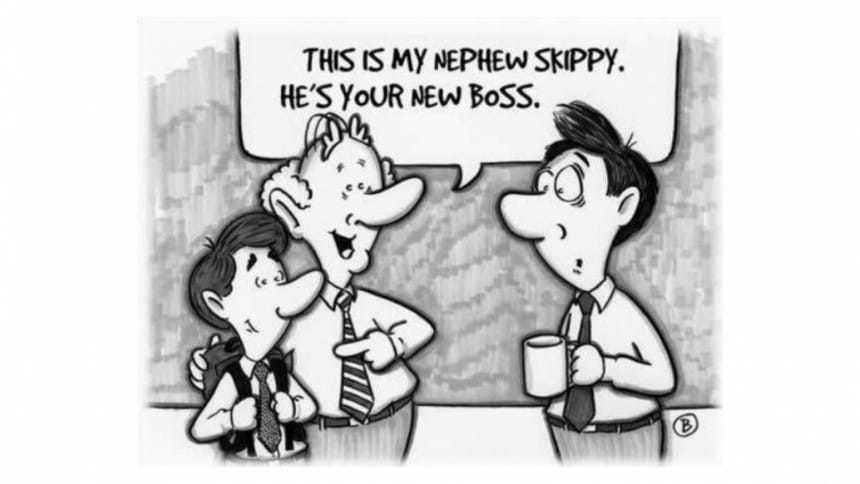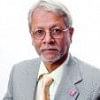Conflict of interest, for example…

Often times, at greater intensity than the minister himself or the MP herself, the corporation chairperson, the district commissioner or the police officer in-charge—in happenings that hurt the government, the administration and the party in power—it is the spouse, the children, the nephews and the nieces, the uncles and the aunts, the PS, the APS, the PS to the APS and the driver, who in varying styles execute such clout (read "power") that it is not clear whether it is in the know of the actual authority whose name is being sold. Psst! One has to be acquainted with Bangalee culture to appreciate the connotation and context of "sold".
For example, if an MP is chairing a school/college board and the mononiyo's daughter or a distant relative is a student therein, it is possible that some telua headmaster/principal will orchestrate academic and extra-academic advantages for the child. These may include, but is not restricted to, awarding extra marks in examinations, being selected to present a wreath to the chief guest (daughter garlanding pita), undeserved inclusion in the institution's cultural programme, and no queries about absenteeism without rhyme or reason.
For example, a government corporation has called a tender for supply of thousands of dozens of eggs to celebrate Dim Dibosh. Now that's another day added to our annual calendar, with Beef Day, Hilsa Day and Bhat Day under active consideration of concerned ministries. However, there is a genuine egg supplier with chicken backup as well as experience (ouch!), but if the party happens to be related by blood or otherwise to the chairperson or the chief engineer or the CEO, there will be murmurs about "fowl" play. The whispers usually find voice after the "boss" has been transferred or has fallen in the esteem of the government.
For example, an architect has designed a building. According to the morals of architectural practice, the construction of the building should be carried out by some other entity, known as a contractor. This division of work protects the architect from being suspected by the building owner of gleaning surplus financial benefits when the architect proposes changes, additions and deletions to the design after he assumes the auxiliary role of constructing the building or that of supplying building materials. Engineers could be entangled in similar conflicts. On that count, developer firms owned by or employing architects/engineers harbour conflict of interest if design and construction of a building is accomplished in-house under a single decision-maker.
For example, a university professor was tickled to bits conducting a lecture as sitting before him was his beloved daughter among other students. Some people fancy the prohibited, and so the same teacher was also taking his daughter's practical course. He may have adopted the fairest of evaluation and had closed his eyes while putting down the marks. His daughter may indeed have been the best student in the class. But, even if she did well by her own standards, the grades will be considered a 50/50 collusion by daughter and father. And yes, they lived in the same house. Such an arrangement is unthinkable even at kindergarten level—a mother as class teacher of her own child, simply because the other children do not have their mom anywhere near them.
For example, imagine an interview board. The father-in-law of a candidate is on the board. Why? He was nominated by the candidate's father, the chairman of the institution. The boy was among the top of his class. Perhaps he would have got the job without the need of his abba hujur sitting across the interview table. But, soon after his appointment, tongues began to wag that the selection was a crude specimen of nepotism, and a result of complicity by the in-laws.
For example, a man has been charged with whatever, and lands in a court. Is it possible that the judge would be his father or uncle or grandfather or a distant relative? If it does by sheer coincidence, that is when conscientious judges use the armour "feeling embarrassed" and opt out of that court, or the case is transferred to a different and neutral court of law.
For example, a journalist has unearthed a factory of spurious drugs, and finds that his own uncle is involved in the unscrupulous production. What does he do? If he shelves the scoop, he would be guilty of letting his uncle off the hook, and doing disservice to the nation. If he breaks the story, even if he covers all the details, the sceptic would pounce back that he has been easy on his uncle. The only noble option for him is to pass on the story to a colleague and move on.
For example, a government officer was elected president of an association of professionals. That's great and well-deserved! The conflict emerged when as a public servant he was party to implementing a national project—cutting down dozens of ageing trees. Many members of his association and others objected to the degradation of the environment, but the president could not express due solidarity. Nor could he join the rally at the grounds where the trees were being felled. The president too felled his association because of a conflict of interest.
For example, a cricketer cannot expect his father to be one of the umpires, or even the third. "Howzzzat, Baba?" does sound weird.
For example, lottery organisers bar employees of the organisation and their families from participating. (Cough, cough) "Ahem! And the raffle winner of a Thanda Brand refrigerator is the CEO of the Thanda Refrigerator Manufacturing Company!" Hardly credible.
For example, a TV channel owner decides to sing songs on his channel when many believe he does not need to.
For example, during the liberation war in 1971, some freedom fighters did not spare their fathers and uncles who were on the other side. That is the supreme example of overcoming conflict of interest. As always, a salute, comrade!
Dr Nizamuddin Ahmed is a practising architect, a Commonwealth Scholar and a Fellow, a Baden-Powell Fellow Scout Leader, and a Major Donor Rotarian.





Comments